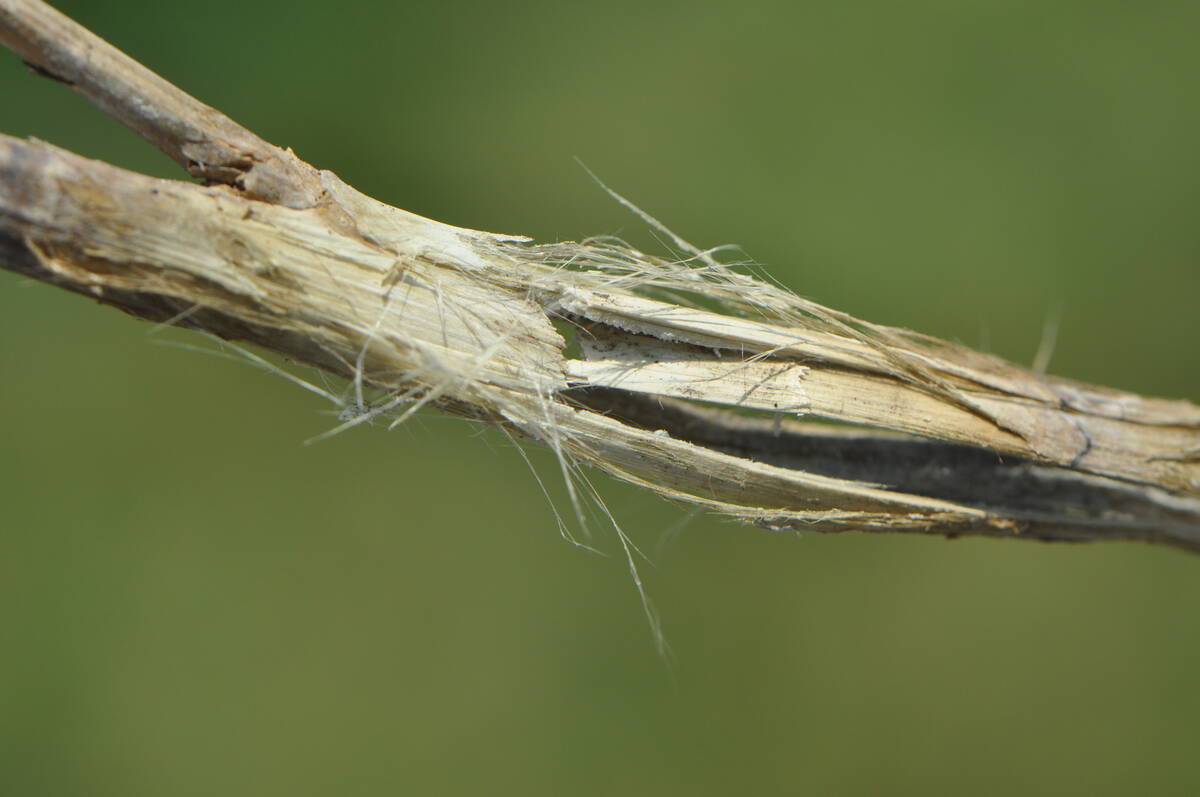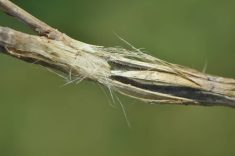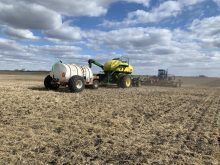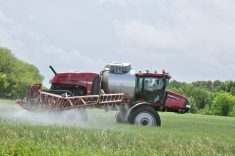Municipal drains are overflowing into fields while provincial drains
and rivers are all at full capacity creating a slow run-off of water.
Crop damage will be extensive in areas.
SOUTHWEST:
Seeding operations continued at the start of last week but was halted by the weekend’s rainfall. High amounts of precipitation were recorded across the region. Strong winds were reported north of Souris and in the Medora area. Several areas also received hail. Overall moisture situation is rated as excessive.
Read Also

Manitoba sclerotinia picture mixed for 2025
Variations in weather and crop development in this year’s Manitoba canola fields make blanket sclerotinia outlooks hard to pin down
Cereal crop seeding is 80 per cent complete and oilseed crops 70 per cent complete. Earlysown cereals are in the three-leaf to tillering stage. Low-lying areas have standing water. Dry weather is needed for producers who still have acres to seed. The wet conditions will delay weed control measures.
NORTHWEST:
Spring planting operations continued with seasonal temperatures and favour-able weather conditions. Cool temperatures and a widespread weather system, late in the week, brought upwards of 90 mm of rain to the southern areas. Lesser amounts fell through the Swan Valley where seeding is less advanced. A few localized areas are now extremely wet and at risk of not being seeded. Good progress was made with canola planting and about 15 per cent remains to be seeded. In-crop herbicide spraying on wheat had just begun prior to the rain, wet field conditions are of concern. Majority of wheat is in three-to four-leaf stages. Peas are three-to four-leaf stages.
Trap counts of diamondback moths are low to date, and cutworm activity was reported around the Ste. Rose area.
The cool, moist conditions have promoted good pasture growth. Some hayfields are suffering from standing water.
CENTRAL:
Heavy rains have hit much of the central region, with widespread amounts of 100 mm or more. Isolated areas in the north and west saw as much as 175 mm; pockets in the east and south escaped the worst, with only 25 to 60 mm. Rapid runoff has washed out some roads and erosion is an issue in some areas; standing water in fields is widespread. Drains and ditches are full, and fields are unable to drain until water levels drop. Rivers and coulees are rising, and areas adjacent are seeing water backing up into fields.
Seeding is essentially complete, with some canola, soybeans and edible beans left to go in. Excess moisture may result in reseeding, once water gets away and fields dry up. It’s too early to assess the extent of damage. Some reseeding due to excess moisture had already occurred prior to the heavy rains.
Staging of crops varies widely; with earliest-seeded cereals up to five leaves and tillering. Canola is germinating to four leaves, most of the corn has emerged, as have sunflowers and flax. Soybeans are germinating to first trifoliate. Fifty per cent of the potatoes have emerged.
Most winter wheat fields have seen herbicide application.
Dugouts are full. Pastures, hay and alfalfa fields have been doing well, although some may suffer due to the recent rains. Most cattle are on summer pasture.
Herbicide applications have been delayed due to wind and wet conditions. Weeds are getting ahead of some crops, and the recent rains have made matters worse.
EASTERN:
Spring planting in the region is complete with the exception of some producers reseeding in areas. Precipitation early in the week plus excessive rainfall amounts late in the week resulted in extensive flooding in all fields throughout the area. Municipal drains are overflowing into fields while provincial drains and rivers are all at full capacity creating a slow run-off of water. Crop damage will be extensive in areas. Prior to the weekend rain, all crops had very good to excellent yield potential. Germination, emergence and plant population was very good to excellent for all crops. Crop stage in cereals range from two leaf to tillering while canola are in cotyledon to four-leaf stage.
Recently seeded soybean fields had excellent emergence. Corn and sunflowers are also emerging very well as a result of the recent temperature increase. Producers are scheduling fungicide applications in winter wheat fields as yield potential looks very promising.
First-cut alfalfa will begin once field conditions improve. Weed populations continue to increase with ideal growing conditions this past week. In-crop spraying in cereals and canola has begun and is expected to increase once field conditions improve.
Flea beetle activity is a concern in late-seeded canola as damage was witnessed in early-seeded fields. Diamondback moths counts are high in a few areas indicating a potential concern later this summer.
INTERLAKE:
Rainfall for the week ranged from 50 to 150 mm across the region. Accumulations were high in the south with the highest rainfall falling on the Warren-Marquette area. Teulon and Moosehorn received about 75 and 87 mm respectively, while the rest of the Interlake received 50 to 60 mm. The entire region is experiencing field flooding from rain as well as drainage backup. Crop loss is expected to be substantial.
Seeding progress in the north was good through Wednesday and Thursday, leaving the north at about 80 to 90 per cent complete. Wet conditions will delay seeding much further on those acres still unseeded. Herbicide application was general across the region with the south completing 60 per cent or more of the cereal and oilseed spraying.
Hay and pasture are showing good production, although field flooding will cause harvest problems and crop damage, especially in the south. Most cattle have been released on pasture and supplemental feeding is still taking place in some areas.


















